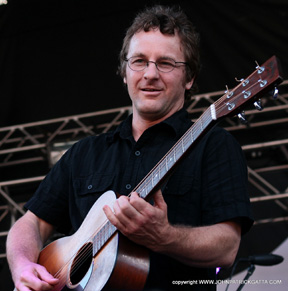
Photo by John Patrick Gatta
Railroad Earth’s Todd Sheaffer was in good spirits for this conversation which took place shortly after his reunion dates with From Good Homes. From there rejoining RRE band mates for a series of shows that have extended into February. He has a reason for such a positive outlook as Railroad Earth’s self-titled album has proven to be the group’s most well-received release. The nine songs display continued artistic growth, and even spice up the proceedings with electric guitar, yet maintain the sextet’s core sound.
Overall, it was a relaxed conversation that dealt with “Railroad Earth,” his solo dates, songwriting, performing with two bands and much more.
JPG: It used to be a big deal if a musician did something outside of his main group, say a side project. It was viewed as ominous trouble within the band. But you do that with From Good Homes. Tim [Carbone] does outside stuff. John [Skehan] does outside stuff. Is it just a matter that you guys are old enough and mature enough that it’s okay?
TS: In a way it’s good for the band to have other outlets for other musical expressions. I know, for me personally, doing my solo shows, which I do, I’ll be doing a solo run in February in Colorado and John’s going to join me. It’s just another way of expression. I play a bunch of different material and I also play just by myself, solo stuff. That’s a whole different side of my art, whole different side of my music that I’m able to do, and it’s a more intimate connection with Railroad Earth fans to come to those shows. They see another side to some of the songs. They get a whole different insight into those songs.
So, I think it and with From My Good Homes…I mean, that’s been a real celebration. I grew up with those guys, went to high School with them. My very first chords ever played on a guitar with those guys. I think it would be more unnatural if I didn’t get together with them, some of my oldest and dearest friends.
And I think these things are all good. They all feed the soul and they allow a person…allowing these things to happen just allows you to grow as a musician. I know that John, for example, did a show with his friend Todd Collins where he explored music of an Italian violinist. That was great for him. It’s a musical growth and it’s learning, and people bring that to the band and the band grows. I think it’s good. I don’t think it’s ominous. I think it’s a good thing.
JPG: Speaking of those solo dates back in December 2009, were you playing any of the songs that were included on the Railroad Earth album? Did those solo dates help you in some way with that album?
TS: No, not really. This album, I had a lot of the material in the can already. Some of the songs, the first song, “Long Walk Home,” for example, had been a staple of my solo shows for years. Actually, tends to be a second set opener (laughs). I wasn’t experimenting with the material. Sometimes I do, but this particular album, not really. I had all the songs together on that one.
JPG: Both “Long Walk Home,” and “Black Elk Speaks” were written with From Good Homes members. What was it about those two songs that you decided, ‘Let’s bring it in and record it with Railroad Earth’?
TS: “Long Walk Home” was a song that had gone unrecorded, and we really didn’t even play it a whole lot with From Good Homes. It’s kind of a lost gem, maybe, something to bring back.
The Railroad Earth album also was all about shaping an album, making a body of work that holds together and has a flow and has a vibe and mood to it and works together. So, those songs just seemed to work with the other material. “Black Elk,” we were experimenting with electric guitar with this album and that was a good vehicle to do that with. Lyrically, I look at that song as kind of a bookend to “Jupiter.” They’re kind of the two bookends to the album. You counterbalance “The Jupiter and the 119,” thematically, on the album, too. That’s why it ended up there. It just seemed to work with the album.
JPG: Speaking of the flow. When I heard “On the Banks,” it seemed like if the album was a movie that would be like the end credits. Then, “Potter’s Field” followed, and going back to musical terms, it was almost like an encore. Since you brought up flow and the vibe, what was your intention in regards to those songs?
TS: It’s just the pacing of the songs and some lyrical content. But that can be a big question there. Really, it’s just the pacing. After two years, the exploration musically, the musical moment went exploring and took it out on “Spring-Heeled Jack.” It just felt like you had that tension and release, and then you have the intimate, you’re ready for that “On the Banks.” I’m not sure how to describe that moment. It just seemed to flow right into it and that’s why it ended up there.


No Comments comments associated with this post